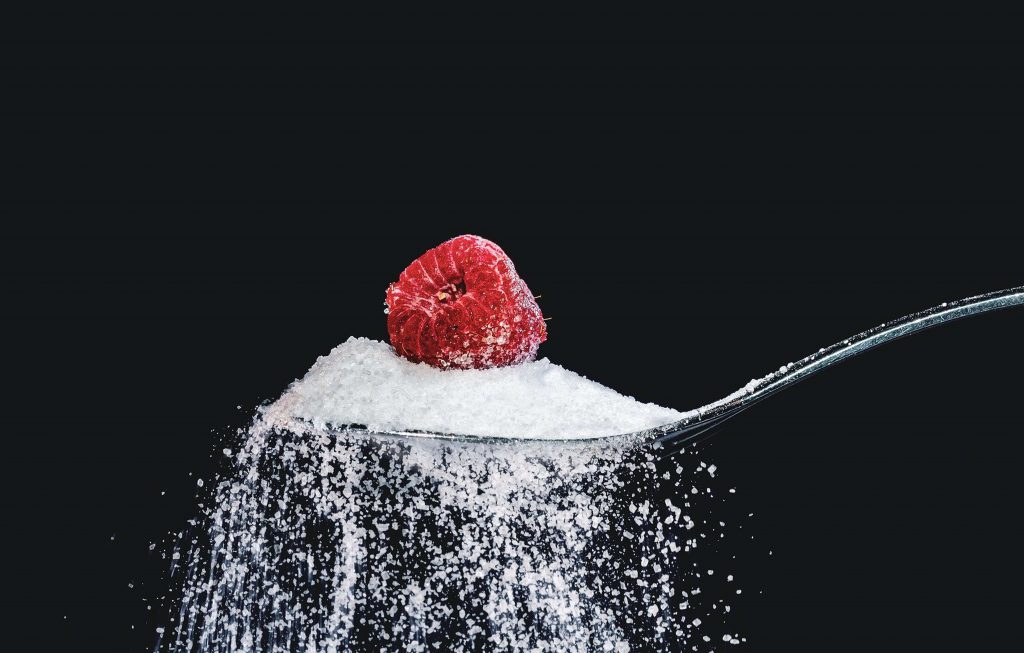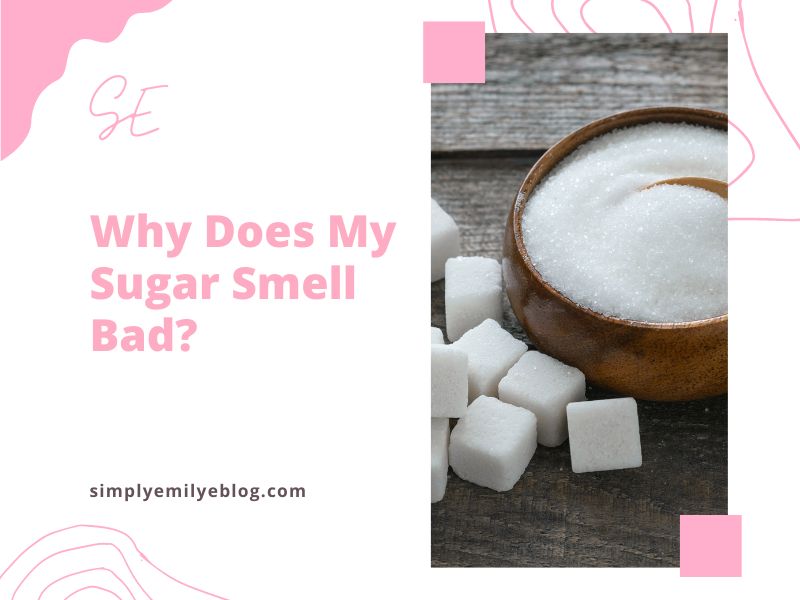When I opened my bag of sugar to add a couple of teaspoons to my tea, a powerful and foul smell caught me off guard. The smell was so rancid that I had to quickly close the bag and take it outside to prevent the stench from lingering in my apartment.
- Why Does My Sugar Smell Bad?
- Why Quality Sugar Matters
At first, I thought it might be my nose playing tricks on me, but after multiple attempts, the odor was still the same. I was perplexed and curious to find out what was causing my sugar to smell so bad.
I had never experienced anything like this before, so I immediately went online to research why my sugar would emit such an unappetizing odor. What I found answered my question, but the information was still somewhat alarming.
Sugar is a natural ingredient that eventually ferments, especially if not stored correctly. When sugar ferments, the result is an awful smell that can catch anyone off guard. I realized that my mistake was storing the sugar in a damp location, which accelerated the fermentation process.
Why Does My Sugar Smell Bad?
Have you ever picked up a bag of sugar from your pantry, only to be hit with an unpleasant odor? I certainly have, and I was puzzled by it for a while. After some research and experimentation, I discovered a few potential reasons why my sugar was smelling bad.
Moisture
Firstly, moisture is the biggest culprit when it comes to funky-smelling sugar. If sugar is exposed to moisture, it can easily absorb the odors around it. In case you’re curious about the fridge life of cooked tilapia, I’ve written a fantastic article that you might find interesting. Whenever you’re available, give it a read. This can happen if the sugar is not stored properly, or if there is excess humidity in the environment. So, if you have noticed that your sugar is smelling bad, the first thing to check is if the bag or container it’s stored in has been tightly closed.
Infestation
Another reason why your sugar could be smelling bad is due to infestation. Unfortunately, sugar is a prime target for pests like ants and cockroaches. These insects can easily contaminate the sugar and leave behind a smell. So, it’s important to inspect your sugar storage area and ensure that there are no signs of infestation.
Quality and age
Lastly, the quality of the sugar itself could be to blame. If the sugar is old, has been stored for too long, or is of low quality, it can start to produce an unpleasant odor. In this case, it’s best to simply throw out the old sugar and invest in a fresh batch.
So what we have here? Bad-smelling sugar could be due to moisture, infestation, or poor-quality sugar. As I learned from my personal experience, it’s important to store sugar in a dry and secure environment, as well as regularly check for signs of infestation.
Signs of Spoiled Sugar
As someone who has experienced the unpleasant aroma of spoiled sugar firsthand, I can tell you that it’s not something you want to encounter in your kitchen. Here are a few signs that your sugar may have gone bad:
- Unpleasant Odor – When you open your sugar container, the first thing you’ll notice is the smell. Spoiled sugar has a distinct odor that can range from slightly rotten to downright putrid. Trust me, you won’t miss it.
- Mold or Clumping – Another sign that your sugar is spoiled is the presence of mold or clumping. Mold can grow on moist sugar and appears as green, black, or white spots. Meanwhile, clumping occurs when sugar absorbs moisture from the air, leading to a sticky mess.
- Strange Texture – If your sugar feels sticky, slimy, or gritty, it may be spoiled. When sugar absorbs moisture, it can change texture, becoming thick and clumpy. You don’t want to add that kind of sugar to your baking or drinks.
- Off-Color – Sugar should be white or light brown in color. If your sugar has turned yellow or dark brown, it’s likely past its prime. This discoloration is due to caramelization, which occurs when sugar is exposed to heat.
To avoid encountering any of these unpleasant signs, store your sugar in an airtight container in a cool, dry place. Keep it away from moisture and any strong aromas that can seep into the sugar. If you do notice any of these signs, it’s best to throw out the spoiled sugar and start fresh. Trust me, your taste buds will thank you. Hold up! If you’re curious about the nutritional value of Eggo waffles, I’ve written a superb article. Check it out whenever you can.

Common Causes of Sugar Spoilage
As someone who has experienced the unpleasant smell of spoiled sugar, I can attest that it’s not a pleasant experience. Sugar can spoil for a variety of reasons, many of which can be easily prevented. In this section, I’ll discuss the most common causes of sugar spoilage.
Exposure to Moisture
One of the most common causes of sugar spoilage is exposure to moisture. When sugar is left in a humid environment, it can quickly absorb moisture from the air, causing it to clump together and eventually spoil. This is particularly true of brown sugar, which has a higher moisture content than white sugar. To prevent this, it’s important to store sugar in an airtight container in a dry place.
Bacterial Growth
Another common cause of sugar spoilage is bacterial growth. Bacteria can survive in sugar, particularly moist or crystallized sugars, and can multiply rapidly if given the chance. This is why it’s important to avoid storing sugar in dirty or damp conditions. If your sugar has been exposed to moisture or dirt, it’s best to throw it away and replace it with fresh sugar.
Pests
Lastly, pests such as ants or other insects can also cause sugar spoilage. These pests are attracted to sugar and can easily infest bags or containers of it. To prevent this, store your sugar in sealed containers and make sure to keep your pantry or storage area clean and free of food debris.
In conclusion, exposure to moisture, bacterial growth, and pests are the three most common causes of sugar spoilage. By taking this simple steps to prevent these issues, you can ensure that your sugar stays fresh and tasty for much longer.
Does Sugar Go Bad? Here’s What You Need to Know
You may be wondering if sugar can go bad and what signs to look for. The short answer is no – sugar doesn’t go bad in the sense that it won’t make you sick, but it can certainly change its taste, texture, and quality over time.
Here’s what you need to know:
- Sugar is a natural preservative itself. Due to its low moisture content, it creates a hostile environment for bacteria, thus making it resistant to spoilage.
- However, sugar can become exposed to moisture, which can cause clumping, hardening, or changes in texture and color.
- The presence of insects or pests can also indicate that sugar has gone bad. While eating sugar that has been infested with insects won’t necessarily make you sick, it can definitely be unappetizing.
- Brown sugar contains molasses, which can cause it to harden over time. If you notice that your brown sugar feels like a rock, you can remedy this by microwaving it for a few seconds or storing it with a slice of bread or a moist paper towel.
- Granulated sugar has a shelf life of around 2 years, while brown sugar has a shelf life of around 6 months to a year.
- If you want to ensure that your sugar stays fresh for as long as possible, store it in an airtight container away from light and moisture.
While sugar doesn’t necessarily go bad in the same way that other foods can, it can be affected by moisture, pests, and time. By taking appropriate storage measures, you can ensure that your sugar stays fresh and of high quality for longer.
How to Store Your Sugar Properly
As I discovered firsthand, the smell of bad sugar can be quite unpleasant and even ruin your baked goods. But the good news is, you can prevent this from happening by properly storing your sugar. Here are some tips that I’ve learned:
Keep it in an airtight container
Wait a minute first. I’ve recently written an excellent note on the calorie content of rice and beans. Give it a read when you can spare a moment. When sugar is exposed to air, it’s more likely to absorb moisture and develop clumps or bad smells. That’s why it’s essential to store it in a tight container that won’t let any air in.
Store in a dry place
Moisture is the enemy of sugar, especially when it comes to how it smells and tastes. So make sure you keep it away from humidity or any sources of water.
Avoid direct sunlight
Exposure to sunlight or any heat source can also affect the quality of your sugar. It’s best to store it in a cool and dark place like a pantry or a cabinet.
Use a moisture absorber
If you live in an area with high humidity or have experienced problems with clumpy sugar before, you may want to consider using a moisture-absorbing agent like silica gel packets or rice.
Not only will these tips keep your sugar fresh and free of any unpleasant odors, but it will also ensure that you get the best results when baking and cooking. So, if you’re wondering why your sugar smells bad, it may be time to check how you’re storing it.
Is Expired Sugar Safe to Use?
We’ve all been there before – you reach for a bag of sugar in your pantry, only to realize that it expired months ago. You might be wondering if it’s still safe to use in your recipes. As someone who loves to bake and cooks regularly, I’ve had my share of experience with expired sugar, and here’s what I’ve learned.
First, let’s talk about what happens to sugar when it expires. Essentially, sugar is a natural preservative and does not spoil. However, over time, it can lose its potency and clump together, making it harder to use in recipes. While the sugar might still look fine, it can have a strange smell that led you to wonder if it’s still usable.
Second, the expiration date on sugar isn’t a hard-and-fast rule. In most cases, it’s just a recommendation for when the sugar will be at its peak quality. If you’re into peanut butter and honey sandwiches, I recently wrote an amazing article. Check it out whenever you get a chance. That means you can probably use it after the date has passed, provided it’s still in good condition.
Here are some tips for determining if expired sugar is safe to use:
- Check for mold or any visible signs of spoilage. If your sugar has been exposed to moisture, it could develop mold or start to spoil. If you see any clumps or visible changes, it’s best to dispose of it.
- Smell it. If your sugar has a strange smell, it’s usually an indicator that it’s no longer usable. Trust your senses on this one – if it smells bad, don’t use it.
- Taste it. In most cases, expired sugar won’t taste too different from fresh sugar. However, if you notice a strange taste or metallic flavor, it’s best to throw it out.
- Look for any insect infestation or pest activity. Expired sugar might attract insects like ants, so it’s important to check if there’s any activity visible around the packaging of the sugar.
Overall, it’s okay to use expired sugar as long as it’s been stored in a dry, cool place and looks and smells fine. However, if you notice any changes or spoilage, it’s best to play it safe and dispose of it. By following these simple tips, you can ensure that your recipes turn out just as delicious, even with expired sugar.
Frequently Asked Questions About Bad Sugar
As someone who has dealt with bad sugar, I know that it can be confusing and frustrating at times. I’ve compiled a list of frequently asked questions to help address some of the most common concerns and misconceptions.
What Causes Sugar to Smell Bad?
The most common cause of bad-smelling sugar is molasses. Molasses is often added to brown sugar to give it a distinctive flavor, but it can also cause the sugar to develop a strong, unpleasant odor over time. Additionally, sugar can absorb odors from its environment, especially if it’s not stored properly.
Is Bad-Smelling Sugar Safe to Eat?
In general, bad-smelling sugar is safe to eat. However, it may not taste very good, and the odor can be off-putting. If your sugar smells bad, try tasting a small amount to see if the flavor has been affected. If the flavor is still good, you can use the sugar in your baking and cooking as usual.
How Can I Prevent Sugar from Smelling Bad?
The best way to prevent sugar from developing a bad odor is to store it in an airtight container in a cool, dry place. If you’re worried about odor absorption, consider using a container with a sealable lid, such as a mason jar or a plastic storage container.
Can Bad-Smelling Sugar Be Fixed?
In many cases, bad-smelling sugar can be salvaged. If your sugar smells strongly of molasses, try spreading it out on a baking sheet and leaving it in the oven at a low temperature (around 150 degrees Fahrenheit) for a few hours. This can help to evaporate some of the excess moisture and reduce the odor.
Is Bad-Smelling Sugar a Sign of Spoilage?
No, bad-smelling sugar is not a sign of spoilage. While it may not smell great, it’s still safe to eat and can be used in your favorite recipes. If you’re unsure whether your sugar is still good, try tasting it to see if the flavor has been affected. If the flavor is still good, it’s fine to use in your cooking and baking.
Tips for Preventing Bad Smelling Sugar
Now that you know what can cause sugar to have a bad smell, here are some tips to help prevent it from happening in the future:
Store sugar properly
Keep sugar in an airtight container in a cool, dry place to avoid exposure to moisture and strong odors.
Check expiration dates
Make sure to use sugar before its expiration date to prevent it from going stale and losing its natural aroma.
P.S.: But if you’re curious about whether peach cobbler requires refrigeration, I’ve written an excellent article. Feel free to read it at your convenience.
Keep equipment clean
Before storing sugar, wipe down measuring cups and spoons, as well as any containers used for storing the sugar, to prevent contamination.
Avoid exposure to heat
Sugar can melt and create a sticky mess when exposed to high heat. Keep sugar away from direct sunlight, stovetops, and other sources of heat.
Buy from a reputable brand
Choose sugar from a trusted brand with a good reputation for quality control and safe storage.
By following these tips, you can prevent your sugar from developing a bad smell and ensure that it stays fresh and flavorful.
Why Quality Sugar Matters
As someone who enjoys adding sugar to my coffee and tea, I was surprised to find out that not all sugar is created equal. After some research, I discovered that the quality of sugar can greatly impact the taste and scent of the final product. Here are some reasons why quality sugar matters:
Purity
High-quality sugar is more pure and contains less impurities than lower quality sugar. These impurities can contribute to an unpleasant odor and taste. When making coffee or tea, for example, the natural flavor and aroma of the beverage can be easily overpowered by the impurities in low-quality sugar. Opting for high-quality sugar can greatly enhance the overall taste and smell of the final beverage.
Production Process
The production process of sugar greatly affects its quality. High-quality sugar is produced using more advanced and sophisticated methods that result in a more refined product. This is often reflected in the price of the sugar, as higher quality sugar tends to be more expensive. The cheaper the sugar, the more likely it is that shortcuts were taken in its production, resulting in a lower quality product.
Health Benefits
While sugar is often viewed as a treat to be consumed in moderation, higher quality sugars can actually offer certain health benefits. For example, natural unrefined sugars such as honey, molasses, and maple syrup contain higher levels of minerals and antioxidants than refined white sugars. Opting for these natural sugars can provide a more nutritious option while still satisfying a sweet tooth.
Ethical Considerations
Finally, the quality of sugar can reflect the ethical considerations of its production. Choosing high-quality sugar from companies that prioritize fair trade practices and sustainability can ensure that your sugar consumption does not contribute to exploitation and environmental harm.
Opting for high-quality sugar can greatly enhance the taste, scent, and ethical considerations of your sugar consumption. By choosing natural, pure and ethically produced sugar, you can enjoy a sweeter treat without sacrificing your taste buds or values.
My words.
As I explored and experimented with different types of sugar, I found that the bad smell was not necessarily an indicator of spoiled sugar. In some cases, different types of sugar may contain natural compounds that produce a particular odor.
Whenever you have a spare moment, I invite you to peruse my captivating article on Wendy’s coffee if you’re keen on expanding your knowledge.
However, it’s important to note that any sugar that has been exposed to moisture or improper storage conditions can spoil and should be discarded.




